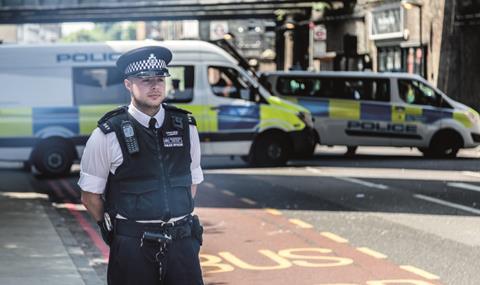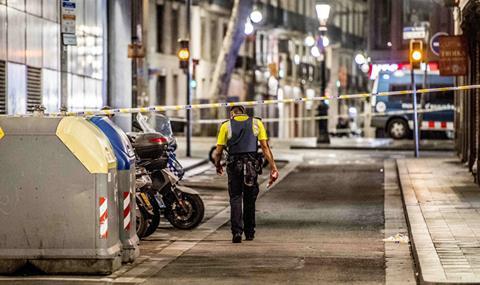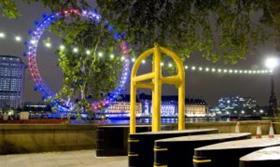
All of us can, and must, play a part in the fight against terrorism. Even before last year’s devastating attacks in Nice and Berlin, police had been working with the commercial vehicle sector to issue advice on how to reduce the risk of terrorists and organised crime gangs using vehicles as part of their attacks.
Recent atrocities in Barcelona and before that London proved that this work is crucial and more difficult than ever, and the industry has a vested interest in the fight. That is because terrorists have earmarked commercial vehicles as their weapon of choice.
“Since the attack in Nice in July last year, we have repeatedly seen terrorists using vehicles as weapons to inflict death and destruction on innocent members of the public,” said detective chief superintendent Scott Wilson, national police co-ordinator for Protect and Prepare at the National Counter Terrorism Policing HQ (NCTPHQ) .
“Daesh [Islamic State] propaganda is telling its supporters to use vehicles as part of their attacks, so it is our job to respond and adapt to this threat.”
The government’s strategy, dubbed Contest, splits that fight into four sections: Protect, Prepare, Pursue and Prevent. The Protect and Prepare sections, which Wilson helps to spearhead, ensure everyone – police forces, government agencies, businesses and members of the public – is given the knowledge to help defend against the threat.
That threat is overwhelmingly posed by Daesh or those inspired by its propaganda, although the recent attack in Finsbury Park, London, demonstrates that this tactic is not exclusive to Islamist extremists.

Terrorists, regardless of their ideology, are using these vehicles as weapons, and it is innocent members of the public who are caught in the crossfire.
Eyes and ears
So how can we, as industry professionals, reduce the number of people senselessly mown down in the name of terror?
Quite simply, through numbers. The freight industry is the fifth largest employer in the UK, with more than one million HGV licence holders, and other professional drivers and support staff.
That is a lot of people to look out for suspicious activity and report it to the police if necessary.
“The threat level in the UK is severe, and is likely to stay that way for some time,” said Wilson. “Tragic events this year remind us that attacks can occur at any time or place without warning. UK counter terrorism policing responds to attacks and any changes in tactics used by terrorists by collaborating with partners and industry to mitigate the threat posed.
“While there is no specific intelligence to suggest such an attack is imminent, we are working with HGV and vehicle rental industries to increase awareness of this specific threat, and the role businesses and individuals can play to keep the public safe.
“We have found that ensuring businesses and employees know that simple steps, such as keeping vehicles secure when left unattended or fully checking the details and documents of anyone wishing to hire a vehicle, can work to reduce the risk posed to the public from vehicle-borne attacks.”
Specialist guidance produced for the CV industry by the National Counter Terrorism Security Office is available on its website and police have been working with industry partners to create and distribute advice.
The first victim of the Berlin vehicle attack was not a pedestrian but the vehicle’s driver, who was found slumped in the passenger seat by German police. This demonstrates that we have our personal safety to consider as well as that of others.
Much like the public-facing awareness campaign ACT (Action Counters Terrorism), the guidance wants drivers and staff to be alert, but not alarmed, and to report suspicious behaviour where and when they see it.
That can be via the police on 999 if an emergency, or via the confidential hotline on 0800 789 321.
Technologies
Beyond the usual awareness campaigns, Wilson’s team is working alongside partners in the DfT, DVLA, Home Office, MI5, MI6 and industry bodies such as the RHA and FTA to see how technology can be used to prevent another attack similar to that on London Bridge or in Finsbury Park.
“We are investigating whether technologies such as automatic breaking, immobilisation, or tracking devices can help us reduce the risk to the public,” Wilson said.
“We’re also working with the Centre for the Protection of National Infrastructure to deliver a range of hostile vehicle mitigation, such as the National Barrier Asset (NBA), that is suited for permanent and temporary events.”
The NBA is a collection of temporary security barriers (pictured) available for police forces, local authorities or private events companies to provide additional security at events.

But Wilson hopes this much-needed collaboration between police and the haulage and commercial goods industries will mean such drastic defensive measures will not be needed.
“As Protect and Prepare officers, the crucial aspect for us is to limit the opportunity for terrorists and prevent attacks before they happen,” he said.
“Businesses can help by reporting missing vehicles, or by installing immobilisers or trackers on their fleets, while drivers and other staff members can be aware of their surroundings and be quick to report anything suspicious when they see it.
“It is only by working together – police, government and industry – that we can make a substantial difference in the fight against terror and, most importantly, save countless lives.”
- To report suspicious activity on the confidential hotline, call 0800 789 321. In an emergency, dial 999. All safety and security advice can be found at gov.uk.













